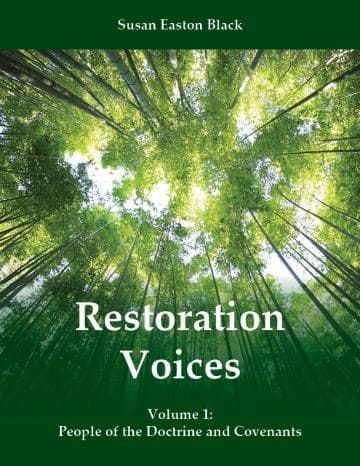Book
135 Chapters

In 1810 Joseph Knight Sr. and his family moved to Colesville, New York. There Father Knight purchased a farm and built a gristmill near the Susquehanna River. In 1826 he became acquainted with twenty-one-year-old Joseph Smith. When Joseph told the Knight family of his visitations with angel Moroni, Joseph Knight Jr. recalled, “My father and I believed him, and I think we were the first to do so, after his own family.”[1]
Joseph Smith was grateful to Father Knight for his financial assistance. Father Knight later recalled, “I let him have some little provisions and some few things out of the store, a pair of shoes, and three dollars in money to help him a little.” Perhaps more importantly, he gave Joseph money to buy foolscap paper so he could continue the translation of the Book of Mormon rather than relinquish it for a season.
However, Father Knight hesitated to be baptized into the Church of Christ. Although he had thoughts of going forward with the ordinance, having not read the Book of Mormon he believed it appropriate to wait. Aware of his reticence to be baptized, Joseph Smith prayed for Father Knight and received a revelation in April 1830 encouraging him to “unite with the true church, and give your language to exhortation continually” (D&C 23:6–7).
Father Knight entered baptismal waters on June 28, 1830. Following his baptism by Oliver Cowdery, he became a target of religious persecution. Rather than deny his faith, he and his family moved away from persecution in Colesville to the small community of Thompson, Ohio, and then to Jackson County, Missouri. By 1839 they had settled in Nauvoo. The Nauvoo High Council, aware of Father Knight’s faithfulness and increasing poor health, donated a house and acreage to him. When Joseph Smith saw Father Knight hobbling along the streets of Nauvoo without a cane, he approached his elderly friend and pressed Father Knight’s fingers on the top of his cane and said, “Brother Knight, you need this cane more than I do.” On January 22, 1842, the Prophet Joseph wrote of his faithful friend:
Joseph Knight . . . was among the number of the first to administer to my necessities . . . For fifteen years he has been faithful and true, and even-handed and exemplary, and virtuous and kind, never deviating to the right hand or to the left. Behold he is a righteous man, may God Almighty lengthen out the old man’s days; and may his trembling, tortured, and broken body be renewed . . . and it shall be said of him, by the sons of Zion, while there is one of them remaining, that this man was a faithful man in Israel, therefore his name shall never be forgotten.[2]
Father Knight and his family joined other Latter-day Saints in the 1846 exodus from Nauvoo to the Territory of Iowa. Although Father Knight had hoped to reach the Rockies, he died in February 1847 at age 74 in Mount Pisgah, a Latter-day Saint encampment in Iowa.
[1] Joseph Knight Jr., “Joseph Knight's Incidents of History from 1827-1844” compiled August 16, 1862, film of holograph, as cited in William G. Hartley, “They Are My Friends”: A History of the Joseph Knight Family, 1825-1850 (Provo, UT: Grandin Book, 1986), 18.
[2] Reflections and Blessings 16 and 23 August 1842, 179. Joseph Smith Papers.
Book
135 Chapters
Items in the BMC Archive are made publicly available for non-commercial, private use. Inclusion within the BMC Archive does not imply endorsement. Items do not represent the official views of The Church of Jesus Christ of Latter-day Saints or of Book of Mormon Central.